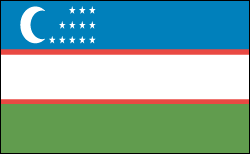Uzbekistan News & Current Events


A Rocky Relationship with the United States
In 2001, Uzbekistan provided the U.S. and UK with a base to fight against Taliban and al-Qaeda forces in neighboring Afghanistan and became the United States' main regional partner in the war on terror. Karimov linked his own battle against the Islamic opposition to the global fight on terrorism. He also exploited the real threat of Islamicism by labeling all of his opponents as Islamic extremists. As a strategic partner, the U.S. has been reluctant to take a firm stand regarding Uzbekistan's dismal human rights record. According to a report in the New York Times in May 2005, the U.S. has sent clandestine planeloads of accused terrorists to Uzbekistan as part of its controversial "rendition" program, the delivery of prisoners to countries with abusive interrogation tactics that are prohibited in the United States.
On May 13, 2005, unarmed antigovernment demonstrators in the city of Andijan were killed in a military crackdown; the number of casualties is still disputed, but it may be as many as 1,000. Earlier, a number of protesters had stormed a prison and released about 2,000 prisoners to protest what they saw as the rigged trial of 23 businessmen. The government claimed the men were Islamic terrorists; the protesters insisted the 23 were antigovernment civic leaders whom the government saw as a threat to its authority. In July 2005, President Karimov ordered the U.S. military to close its air base in Uzbekistan after the U.S. called for an inquiry into the massacre and supported the airlift of Uzbek refugees escaping the violence. The base was shut down four months later, with U.S. forces moving to Kyrgyzstan.
Karimov was reelected in December 2007, taking 88.1% of the vote. The opposition claimed the vote was rigged.
Human Rights Watch Expelled
In March 2011, the Uzbekistan government expelled all Human Rights Watch employees from the country. The government gave no reason for the expulsion. Human Rights Watch released a statement that indicated the decision came after years of harassment by government officials. In the statement, the group said, "Well over a dozen human rights and political activists and independent journalists are in prison, torture and ill-treatment in the criminal justice system are systematic, and serious violations go unpunished." Human Rights Watch called on the European Union and the United States to come down harder on Uzbekistan for its human rights violations.
Both the U.S. and the European Union have worked to improve relations with Uzbekistan in recent months. A neighbor of Afghanistan, Uzbekistan offers a route for the United States to get supplies to get into that country.
Militant Leader Killed by U.S. Drone Strike
In early August 2012, the Islamic Movement of Uzbekistan, a major militant group with close ties to Al Qaeda, announced that the group's leader, Uthman Adil, had been killed in a U.S. drone strike. Adil was killed in Pakistan, near the Afghan border back in April 2012 when a U.S. drone fired missiles into a tribal region. Adil's death was confirmed by a security official from Pakistan who said his death was a "major blow" to the militant group.
The Islamic Movement of Uzbekistan has a reputation for extreme violence even when compared to other militant groups in the region. Therefore, its members have been attacked repeatedly by U.S. drones. One of these previous attacks killed Tahir Yuldashev, the group's leader before Adil.
Presidential elections were held in March 2015. Incumbent Islam Karimov won, receiving more than 90% of the vote. Election turnout was 91%. Uzbekistan's first and only president, Karimov has been in office since 1990.
See also Encyclopedia: Uzbekistan .
U.S. State Dept. Country Notes: Uzbekistan
Ministry of Macroeconomy and Statistics www.gov.uz/







